Harnessing gamification to defeat climate misinformation
Posted on 26 November 2019 by John Cook
For the past decade, I've been researching the psychology of climate denial, exploring ways to counter misinformation about climate change. I came out of my PhD with inoculation as a powerful solution. After completing my PhD, I explored critical thinking as a tool to help develop inoculating messages.
One of the most intriguing leads from my critical thinking work was the potential of parallel arguments. This involves taking the flawed reasoning in misinformation and transplanting it into an absurd situation, making the logical fallacy more obvious. A lightbulb moment for me was realizing that this technique was used every night by late night comedians to debunk the misinformation of the day, in a way that was both entertaining and instructive.
Having worked as a cartoonist before my PhD, I immediately saw that cartoons were the perfect delivery mechanism for parallel arguments. So for the last two years, I've been experimentally testing parallel arguments as a means of countering misinformation on social media. Not only has this research shown that my funny is statistically significant (yes, that was the first thing I checked after data collection), we have also shown that parallel arguments in cartoon form are effective in neutralizing misinformation.

Three challenges in building a resilient public
Despite progress made in these various lines of research, there remain several formidable social and psychological challenges to putting these scientific findings into practice:
- Fast thinking: Our brains have evolved to react to immediate threats such as predators jumping out of bushes, and instinctive, fast thinking (otherwise known as system 1 thinking) dominates our psychology. Performing slow, reasoned thinking (known as system 2 thinking) is effortful and challenging—not because we're stupid but because our brains are hardwired for fast thinking.
- Tribalism: The greatest driver of climate denial is political affiliation (with political ideology a close second). In other words, which political tribe we belong to determines what we believe about the greenhouse effect and climate science. This means that communicating climate science to people who are politically motivated to disbelieve the science is usually ineffective, and sometimes counterproductive.
- Echo chambers: Even if we develop inoculating messages that can overcome fast thinking and tribalism, our society has evolved towards echo chambers where people consume information from sources that they agree with. While cable television began this process, social media platforms have accelerated the problem, using algorithms to deliver content tailored to maximize user interaction and link-clicking. Their business models depend on delivering belief-confirming information.
In recent years, I have continued my research into inoculation while not knowing what to do about those unanswered challenges. A new branch of inoculation research, begun by Sander van der Linden, explored how a game where players interactively learnt the techniques of fake news could train people to detect the tell-tale red flags of fake news. Sander's game focused on teaching media literacy. I wondered whether his approach of "active inoculation" could also work against science denial.
I began designing a game that taught the techniques of denial. One powerful element of gamification is the capacity to use characters and narrative to engage and inform players. I created an archetypal "Cranky Uncle" character who mentored you in the techniques of denial—teaching you how to earn cranky points and eventually become a cranky uncle yourself. I also used cartoon parallel arguments to illustrate understanding of the logical fallacies.



Whenever I mentioned the game to climate scientists, college professors, and high school teachers, I was (pleasantly) surprised at their strong interest in incorporating the game into their lessons. Without even trying, I had educators across the country interested in testing the game and assessing its effectiveness in increasing critical thinking skills.
This made me realize that gamification offered a potential solution to one of science denial's great problems: piercing through echo chambers. Given the hunger in educators for interactive resources that engage students, there was strong potential for a game that taught both climate science and critical thinking to be adopted in classes in red and blue counties all over the country. The seemingly insurmountable challenge of echo chambers suddenly seemed manageable.
Turning critical thinking into muscle memory
I also incorporated quiz questions to get players practicing spotting different types of fallacies. I ran a series of quizzes via Twitter, receiving a great deal of feedback that helped me improve the design of my questions. I incorporated much of this advice in the game design:
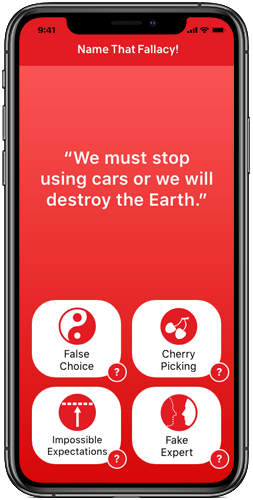
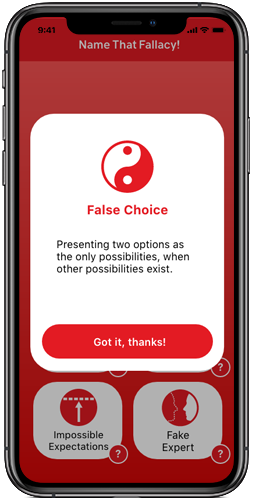
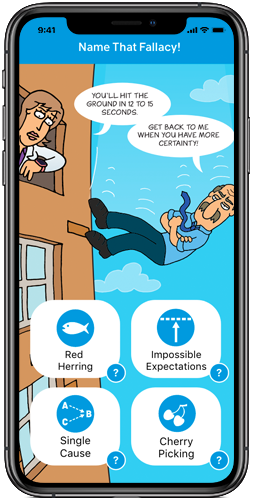
As I developed a large library of fallacy quiz questions, I began to realize that gamification offered a powerful opportunity for educators seeking to teach critical thinking. By using game features such as interactive quizzes, points and rewards systems, and player-to-player contests, players were motivated to continue practicing assessing arguments, spotting fallacies, and honing their critical thinking skills. Essentially, games can help turn a slow thinking task like argument assessment into a fast thinking reaction. Gamification has the potential to turn critical thinking into muscle memory.
I also began talking to Autonomy Coop, a group of marketers using their professional skills for social good. We began a collaboration testing parallel argument cartoons on Facebook (one of our experiments involved sending cartoons debunking the "cold weather disproves global warming" myth into conservative parts of the country about to get hit by a polar vortex cold spell). In our conversations, they opened my minds to the power of players competing against other players, or even more exciting, groups competing against other groups.
I began to imagine a critical thinking tournament, where classes in one school would compete against classes in other schools across the country. Regional contests draw on tribal instincts to motivate players to improve and compete. Imagine tribal instincts motivating students to hone their critical thinking skills, strengthening their resilience against misinformation. The chief driver of climate denial could be employed to help eradicate science denial!
So I began testing a prototype of the game in community colleges and universities. In collaboration with Jasper Fessmann from West Virginia University and David Kinkead from the University of Queensland, we developed a quiz that measured students' ability to detect 11 types of science denial techniques. We tested student's fallacy-detection skills before and after playing a prototype of the Cranky Uncle game. We found that critical thinking ability increased after just 30 minutes of game-play.
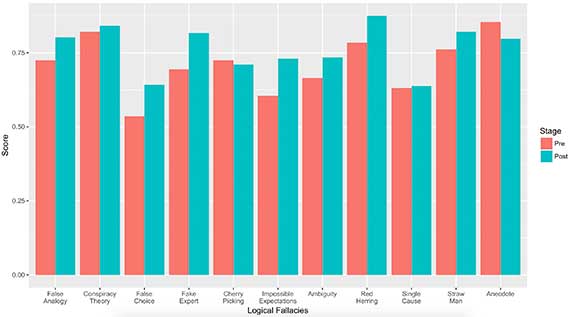
The most exciting thing about this research is that the quiz questions were non-climate-related. A game that explained logical fallacies in climate misinformation imparted resilience against other types of misinformation. Inoculation researchers call this the "umbrella of protection", and is one of the most powerful aspects of logic-based inoculation.
Crowd-funding development of the Cranky Uncle game
Also exciting was that the improvement in critical thinking came from a simple prototype that only simulated the game—it wasn't a properly programmed native app. That is the next step in this project. In order to fund development of the game, I will be launching a crowd-funding campaign early next week. You can sign up to be notified of when we launch at crankyuncle.com.
I've only been involved in crowd-funding once before. In 2013, we crowdfunded the journal fee required to publish our paper on the scientific consensus on climate change. We were surprised and delighted that it only took 9 hours to raise the $1,600 journal fee. The only disappointment was that given our international readership, some people woke up to find we'd already raised the funds and never got to contribute to what turned out to be a historic paper. We thought the consensus study might be significant at the time but never dreamed it would attract attention from world leaders such as President Obama and U.K. Prime Minister David Cameron, and be downloaded over one million times (actually now up to 1,106,341 downloads).
This time, rather than cap our crowdfunding amount, the more funds we raise, the more ambitious our game will become and the greater the societal impact. Here is a brief summary of our stretch goals depending on how successful our crowdfunding campaign is:
- $15,000: iPhone game. Our initial goal will fund development of a native iPhone/iPad version of the game.
- $25,000: Android game. We will also develop an Android version (I'm really hoping we don't end up between $15,000 and $25,000 as I will never stop hearing from Android users).
- $35,000: Multi-lingual version of the game. Thanks to the ever-amazing Bärbel Winkler, Skeptical Science has a robust set of translation volunteers with our rebuttals translated into 20 languages. Our plan is to release the game in German, then explore translation into other languages.
- $50,000: Player-to-player functionality. Adding player-to-player contests will take the Cranky Uncle game to the next level. By adding a social element to the game, it makes it much easier for people to invite friends, challenge people to contests, and help spread critical thinking through social networks. It will also motivate people to play the game longer—the more they play, the more opportunity they’ll have to hone their critical thinking skills.
- $70,000: Classroom functionality. The game is most effective when played in a classroom setting, where educators can seamlessly incorporate the game into their lessons. We will develop resources for teachers within the game, such as the ability to track the progress of a class of students, monitoring individual progress and identifying which fallacies students are struggling with. I will also develop educational resources to complement the game play (I've already given guest talks to a number of classes, my favorite part being when I role-play with the teacher with me playing Cranky Uncle).
- $100,000: Group-to-group functionality. Imagine if a classroom could challenge another classroom to a critical thinking contest, either in the same school or even across schools! Cards on the table: my long-term hope is the game will culminate in a nationwide (or even global) "Cranky Bowl" critical thinking tournament.
One more thing (for now). There is only one time limit with this crowd-funding campaign. We will be offering a number of rewards for donors (more on this later) but the top reward will be a cameo appearance in the game. In other words, I will draw a caricature of you into a parallel argument cartoon that will be used to illustrate a specific denialist technique. For example, I will draw one donor into this example of cherry picking:
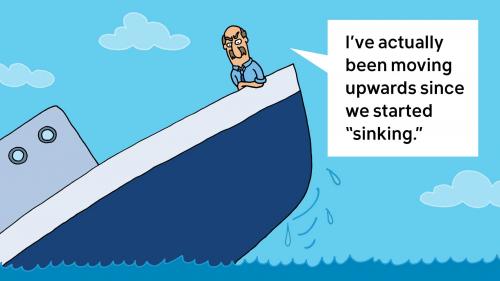
However, I'm only offering this reward to the first 97 "Cameo" donors. Why 97? First, because if you haven't noticed yet, I have a bit of a thing for the number 97. Second, drawing 97 people is a lot of work! Drawing 97 climate scientists nearly killed me! So only the first 97 Cameo backers will get immortalized in the game. If you want to be one of the first to find out when the crowd-funding campaign launches, sign up at crankyuncle.com.































 Arguments
Arguments






























Imho this critical thinking and teaching awareness of logical fallacies is such important work if we want people, especially young people to be informed and make good decisions. I was lucky enough to stumble across a book on logical fallacies while quite young. It's sad that more people weren't talking about all this in the early years of the climate issue, but better late than never, and it will help with many issues beyond the climate issue.
The denialists are in many cases a core group of professional hired guns with no ethical scruples about what they say. It all radiates from there to member's of the public who repeat what they say, all well documented in books like Dark Money and Merchants of doubt.
However there's another perplexing problem discussed in this article. " Repetition is what makes fake news work, too, as researchers at Central Washington University pointed out in a study way back in 2012 before the term was everywhere. It's also a staple of political propaganda. It's why flacks feed politicians and CEOs sound bites that they can say over and over again. Not to go all Godwin's Law on you, but even Adolf Hitler knew about the technique. "Slogans should be persistently repeated until the very last individual has come to grasp the idea," he wrote in Mein Kampf."
This seems like a difficult problem for people to expose and unwind, because every time we discuss some fake statement it repeats the fake statement. Yet its also important to expose falsehoods or they gain traction. It's a perplexing issue.
nigelj,
I share your concern about the repetition of Fictional claims being a significant mechanism for developing and strengthening the popularity of the belief.
Learning critical-thinking to spot misinformation will help, but it requires more of the non-Fiction details to be readily available. It also requires a person to want to seek out the non-fiction and use it to more quickly spot misinformation on an issue.
That desire to expand awareness and improve understanding appears to be lacking in the populations of the supposedly most advanced nations. I even found it lacking among fellow engineers when it came to climate science, even though an engineer can only properly perform their job by expanding awareness and improving understanding and applying critical thinking - no gut reactions allowed.
What I see as a bigger problem is that the general population is not exposed to the Non-Fiction more than the Fictions.
If the Non-Fiction was seen more often it would be harder for the Fictions to stay standing.
Many things probably keep the Non-Fiction from being seen more than the Fiction including:
My experience with climate deniers both directly in my life and others I've met in impersonal formats like online forums is they attach the climate change issue to emotion and personal identity. It is hard to reason with someone when first of all what you are saying causes an emotional reaction, it doesn't stimulate a critical thought process. And secondly when what you are presenting threatens their personal identity.
Something like this would seem to open a back door into the discussion where people stop reacting with emotion and feel like they are being threatened. Instead of a cold analytical description of a complex crisis we have a game designed to allow a much freer flow of accurate information on multiple issues.
Something like this offers multiple benefits as it is effective across a broad spectrum of groups especially younger people. And it will be almost impossible to counter by the climate denial campaign as more and more users become skilled in identifying the denial techniques.
Impressive, I'd say.
Of course, the denialosphere have been using cartoons for years, in particular those of 'Josh'.
Efforts to reduce the ability of people to be misled regarding climate science are helpful. But the influence is limited and may not solve the problem.
A significant reason that people do not accept the expanded awareness and improving understanding of climate science is that they have developed a powerful desire to personally benefit from being incorrect. As I mentioned, even engineers who make a living through critical thinking and pursuing expanded awareness and improved understanding can be powerfully resistant to learning about climate science.
That harmful selfishness is so powerful that the deniers of climate science have moved on to claiming that forcing the reduction of fossil fuel use, rather than just letting the economy do what it will do with minimal external governing interference, will cripple the reduction of poverty or social improvements and cripple environmental protection actions.
Those arguments about the 'Good being Done' make the incorrect claim that it can only happen because of fossil fuel use. And since it is simple to know that fossil fuel use will have to end, and that poverty reduction can occur in regions where there is very little fossil fuel use, there is a large percentage of the population who appear to be willing to benefit from getting away with being wrong.
The developed socioeconomic-political environment is what is developing those powerful desires to benefit from being wrong. People who will not helpfully self-limit their behaviour, people who will not willingly be less harmful to Others, require external governing contrary to their desires.
Correction of the developed socioeconomic-political systems will be hard work, but it is really what is required in order to accomplish the degree of climate action that is now required because of the success of selfishness through the past 30 years. Leaders will have to be very unpopular in a Helpful Corrective Way, like the Australian Leadership that put a significant Helpful Corrective dent in Gun Culture in Australia.
To be even clearer regarding my comment @5,
Every action that increases the acceptance and support for expanding awareness and improvement of understanding among the general population is helpful.
This particular course of action is brilliant, but it needs to be understood to ultimately be limited when it comes to getting the required corrections of developed economic activity and the related corrections of developed attitudes in the population.
It is becoming clearer that it will be necessary for Government intervention in the economy, especially limiting and correcting misleading marketing, especially political marketing. A focus on achieving all of the Sustainable Development Goals can highlight the problem by exposing how many Leadership Contender actions are contrary to achieving those essential objectives, and highlight which groups and individuals are the worst offenders.
What needs to be understood is that the requirement is to develop enough support, a tipping point of support, for Leadership that is willing to disappoint a significant very vocal, easily angered, and very 'sure to vote' portion of the population.
A significant number of people have been tempted to develop a powerful liking for winning by behaving in an understandably incorrect and ultimately unsustainable way. Competing for status based on impressions of popularity and wealth will develop those harmful ways of thinking and acting.
Critical thinking skills and expanded awareness will not change those type of minds (as examples, think of the people with relevant scientific credentials who still gleefully play on the side of the delayers). Their lack of interest in responsibly self-governing their behaviour means that they will need to be Governed in ways that Limit their ability to do what they would like to do.
Significant Government Intervention in the economy is required, particularly significant corrective actions regarding misleading marketing, especially political marketing, even if those actions may be claimed to be harmful restrictions on Freedom of Action or Freedom of Belief.
Leadership is the challenge of deciding who to please and who to disappoint. It is harder to properly Lead when a significant portion of the population have been easily tempted into benefiting by believing what they want to excuse doing what they like. They will readily claim that anything contrary to their interests is an unjustified restriction of Freedom, even if they have developed critical thinking skills and are exposed to expanded awareness and improved understanding.
In my experience the climate denialists who claim on internet forums that mitigating climate change will increase poverty are often the same people who downplay poverty on other forums, and who oppose government level solutions to poverty. People with inconsistent views generally aren't that bright, or they have an undisclosed personal agenda.
nigelj @7
I look at it as a them playing a zero sum game where any issue is simply just one more gambit for a total win. Wealth disparity really isn't a concern for people in that position, it is simply one more gambit to achieve greater control in the game.
It's clear this is a game for the people behind this, just as it was a game for the people behind the disinformation camapign to protect the tobacco industry for decades. It's the same methods and in some early cases like Fred Seitz and Fred Singer the same people formulating this.
It's just happening on a far greater scale because the fossil fuel sector reaches into far more aspects of our economies and our lives than the tobacco lobby ever did.
Doug_C, yes, and your description suggests the sociopathic personality type. Perhaps not every denier, but plenty of the hard core professional ones.
nigelj I think so, there is very little in the way of emotional intelligence being applied to climate denial. Ironically it depends on a hostile emotional reaction on the part of the target audience of the denial campaign. They have to be motivated to oppose any policies that may impact the financial interests of the people and companies central to this.
There's no question that this decades long campaign of denial of basic reality itself has been highly effective and understands the weaknesses in the scientific method. Which would follow because it was designed by some fairly well versed scientists like Fred Seitz and Fred Singer with others like Richard Lindzen picking up the ball later.
With virtually no concern at all for the catastrophic impacts that with business as usual will likely include mass extinction on Earth that could include us humans. Sociopathic behavior of a fundamental nature I'd say.
I would like to donate to cranky uncle, but can't find a way at crankyuncle.com.
Jeff T @11
Thanks! The crowdfunding campaign starts next week on Dec. 3. If you‘d like to get immediately notified once the website goes live, please subscribe at crankyuncle.com